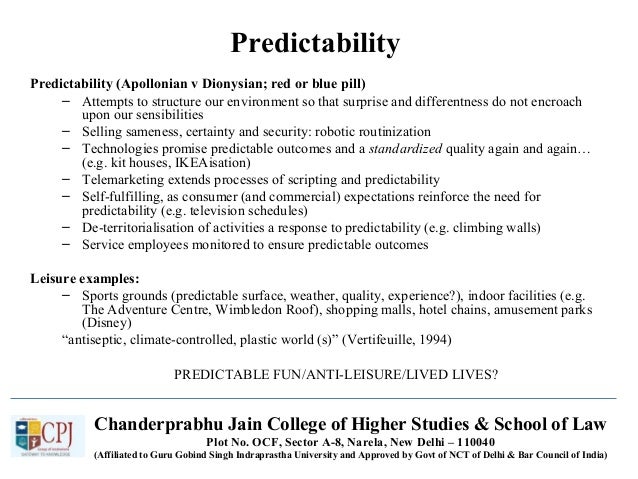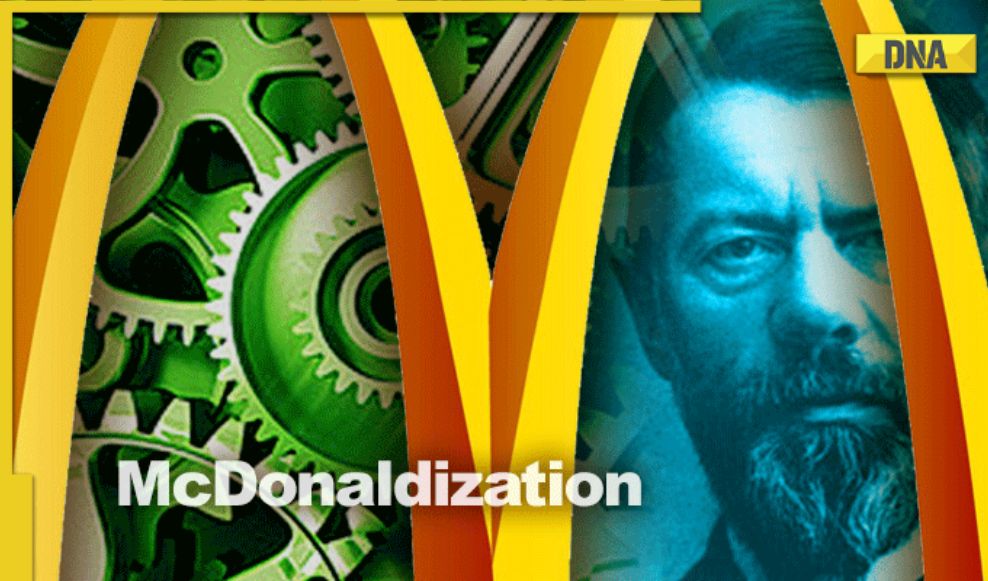Imagine a world where everything runs like a well-oiled machine, predictable, efficient, and devoid of surprises. This might sound like a utopian dream, but it’s also a chilling reality in the age of McDonaldization. The term, coined by sociologist George Ritzer, refers to the process by which principles of fast-food restaurants permeate various aspects of our lives, transforming them into highly rationalized and standardized systems. While efficiency and convenience are alluring, does McDonaldization come with a price?

Image: www.slideshare.net
McDonaldization is more than just ordering your morning coffee through a drive-thru. It’s about a fundamental shift in how we approach work, leisure, and even our relationships, prioritizing efficiency and calculability above all else. As we dive deeper into the principles of McDonaldization, we’ll explore the subtle ways they shape our lives, and ponder their potential consequences.
The Four Pillars of McDonaldization: Efficiency, Calculability, Predictability, and Control
The essence of McDonaldization lies in four key principles:
1. Efficiency: Speeding Up the Process
Efficiency is the cornerstone of McDonaldization. It’s about optimizing every step of a process, minimizing waste, and maximizing output. Just as a fast-food restaurant aims to serve as many customers as possible in the shortest time, McDonaldized systems prioritize speed and productivity. Think about online shopping platforms where you can find what you need with just a few clicks, or automated customer service lines that quickly direct you to the right department. While these systems make tasks faster, they might sacrifice personal touch and nuanced understanding.
2. Calculability: Quantifying Quality
McDonaldization often equates quality with quantity. Rather than focusing on intrinsic value, it emphasizes measurable outputs and outcomes. A restaurant might boast “100 burgers sold per hour,” while a fitness program emphasizes “calorie burn” rather than overall well-being. This focus on numbers can sometimes overshadow the importance of intangible aspects, like creativity, emotional intelligence, and genuine connection.
)
Image: www.dnaindia.com
3. Predictability: Same Experience, Every Time
McDonaldization thrives on consistency and predictability. From the familiar menu at a fast-food chain to the pre-programmed navigation system of your car, we crave systems that provide a reliable and predictable experience. The predictability can be reassuring, but it can also stifle innovation, creativity, and personal expression.
4. Control: Minimizing Human Variation
McDonaldization seeks to minimize reliance on human judgment and expertise. Instead, it favors rigid rules and standardized procedures that ensure uniformity and predictability. Imagine a call center script that dictates every phrase a customer service representative can use. While this offers a degree of control, it can lead to a dehumanized experience for both the customer and the employee, and ultimately limit the potential for creativity and adaptation.
The Rise of McDonaldization: From Fast Food to Everyday Life
The rise of McDonaldization can be traced back to the industrial revolution, where mass production and standardization became the norm. But its influence has only intensified in recent decades, with the advent of technology, globalization, and the relentless pursuit of efficiency.
McDonaldization has infiltrated all areas of modern life:
- Education: Standardized testing, curriculum, and teaching methods have reduced learning to a quantifiable process.
- Healthcare: Fast-paced hospital visits, assembly-line diagnostics, and limited time for patient interactions leave little room for personal connection or holistic care.
- Travel: Budget airlines, pre-packaged tours, and ride-sharing apps prioritize convenience and cost-effectiveness over unique experiences.
- Workplaces: Performance-based evaluations, rigid schedules, and automated tasks can lead to increased pressure and a decline in employee satisfaction.
- Entertainment: Streaming services and social media platforms offer endless choices, but can also contribute to a fragmented and superficial experience.
The Human Cost of Efficiency: Is There a Price for Convenience?
While McDonaldization offers undeniable benefits – convenience, affordability, and accessibility – its potentially negative consequences can’t be ignored. Critics point to:
- Dehumanization: The emphasis on efficiency and control can lead to a sense of detachment and alienation. Employees can become cogs in a machine, and individuals can feel like interchangeable units in a system.
- Loss of Creativity and Individuality: Standard operating procedures and standardized experiences can stifle creativity and innovation, leading to a lack of individuality and personalized expression.
- Increased Inequality: The emphasis on quantity and efficiency can benefit large corporations at the expense of small businesses, leading to a more concentrated economy and an unequal distribution of wealth.
- Environmental Damage: The pursuit of efficiency can lead to resource depletion, pollution, and an unsustainable model of consumption.
Navigating the World of McDonaldization: Tips for Reclaiming Balance
Despite the widespread influence of McDonaldization, we can still retain a sense of individuality and human connection. Here are some tips:
- Choose Consciously: Be aware of the principles of McDonaldization and make informed choices about how you engage with them. Support local businesses, value experiences over material possessions, and prioritize quality over quantity.
- Cultivate Individuality: Explore your unique talents and passions. Participate in activities that foster creativity and personal growth.
- Embrace Human Interaction: Make time for meaningful conversations and genuine connections with others. Resist the temptation to rely solely on automated interactions.
Principles Of Mcdonaldization
A Call for Balance: Beyond Efficiency
It’s crucial to acknowledge the positive aspects of McDonaldization – efficiency, convenience, and access. Yet, its relentless spread raises valid concerns about the human cost of efficiency. By recognizing the principles of McDonaldization, we can make more informed decisions about how we live, work, and interact with the world. Can we find a balance between efficiency and human values, between convenience and meaning? The future holds the answer, and the choice, ultimately, is ours.





